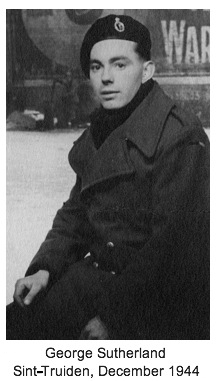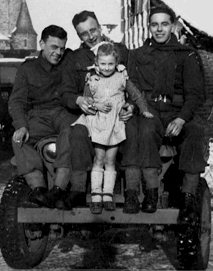World War II
North East Folk Remember The War
Internment on The Isle-of-Man
Peterhead was enjoying a real boom in the herring trade during the 1930s and my father had risen through the ranks from cooper to curing yard manager. This was not to last for long though, and when war broke out in 1939 things changed suddenly as trade with Germany came to a sudden halt, just as it had in 1914, and, as a consequence, a massive surplus of barreled herring was left in the quayside yards.
At the same time the government made a declaration that all German and Italian families living in Britain, people whose sympathies they feared might lie with the enemy, would be placed in secure internment camps. One of the main camps was sited in Douglas on the Isle of Man, where the sea-front hotels and guest houses were surrounded with barbed wire fences, and that's where hundreds of internees were held under guard, some for the entire duration of the war and others sometimes only for a few months while the risk they posed was assessed. As most of the herring were intended for the German market it made sense that the surplus should be used to feed the internees and my father was offered the job of overseeing the yard in Douglas where the herring would be stored for distribution around the camp in Douglas and the other, much smaller, camps at Peel and Ramsey. It was a lucky move for my family, as dad was allowed to take my mother and I with him, away from the dangers of enemy bombing raids on Peterhead. We lived in Peel and I really enjoyed my time there. It was peaceful, I had a job as a trainee mechanic and I learned to drive. I worked at a garage in Douglas and often saw familiar faces on the other side of the big fence. There were about a dozen Italian families from Peterhead in the camp, including some lads I'd been at school with and who were no more likely to be Nazi sympathizers than I was! We stayed there for about three years before we were sent back to Peterhead. Soon after our arrival home I got my call-up papers and, after basic training, I joined the Royal Corps of Signals and was assigned to the 27th Guards Armoured Brigade.
D-Day, The Battle of Normandy
 After training in Norfolk, and a brief spell in Hertfordshire where we got our tanks and support vehicles ready for the tasks ahead, we left for the south coast to make final preparations for what would turn out to be 'Operation Overlord,' the D-Day landings. Our job was to assist and support the 3rd British Infantry Division as they attempted to break through the German lines of defence and make some headway inland. I can see our Brigadier now, proudly announcing that we had been given the honour of being part of the first wave of assault on 'Sword Beach' on D-Day, an honour I'm sure most of us would have been quite happy to do without! So, in the early hours of 6th June, 1944, we crossed the Channel and made for the fleet's rendezous point, code named 'Piccadilly Circus,' a few miles off the Normandy coast, where we awaited orders to go ashore.
After training in Norfolk, and a brief spell in Hertfordshire where we got our tanks and support vehicles ready for the tasks ahead, we left for the south coast to make final preparations for what would turn out to be 'Operation Overlord,' the D-Day landings. Our job was to assist and support the 3rd British Infantry Division as they attempted to break through the German lines of defence and make some headway inland. I can see our Brigadier now, proudly announcing that we had been given the honour of being part of the first wave of assault on 'Sword Beach' on D-Day, an honour I'm sure most of us would have been quite happy to do without! So, in the early hours of 6th June, 1944, we crossed the Channel and made for the fleet's rendezous point, code named 'Piccadilly Circus,' a few miles off the Normandy coast, where we awaited orders to go ashore.
The memories of that time are all a haze now, like a dream, it's hard to believe that it really happened. We were supposed to be in Caen, less than ten miles from the coast, by the evening of the first day, but the fight for the city was long, hard and absolutely dreadful. By the time we eventually got into the place, several weeks later, it was a complete ruin, razed to the ground by bombs and shell fire.
Through the months that followed the liberation army made fairly steady progress as we headed east towards our ultimate objective, Germany. By Christmas my lot were in Belgium, billeted in and around the village of Bevingen, near Sint-Truiden, awaiting the final push across the border into Germany. I lived for a few weeks with the Van Dormael family, some of the kindest and most generous people I have ever met. They treated me like I was one of their own.

Pictured here, me on the right, sitting on the bonnet of a jeep with a couple of pals and Janine, the granddaughter of the people I was billeted with in Bevingen.
When the allied forces from the west finally met with the Russian army from the east, Germany was forced to concede defeat and accept 'unconditional surrender'. When 'Victory in Europe' was officially announced on May 8th, 1945, there was great celebration both at home and with the allied armies in Europe and not long after that a lot of us went home on leave. Though of course we were all thankful to be away, at last, from the battle front, we knew we would face sad news on our return. For me, the loss of my cousin, and life long pal, John was particularly hard to accept. He was the same age as me, a sergeant gunner with RAF Bomber Command, and had been killed when his plane was shot down over Germany during a raid in 1944.
The rumour then was that we were to regroup for an assault on mainland Japan, but thankfully the Japanese surrendered in September that year so that wasn't necessary. Instead I was sent to Palastine where I served with the peace-keeping forces until I was demobbed in 1947.
George Sutherland, born Peterhead, 1927.
'D-Day Dodgers'
A song from George Allen
"This is a wee song, I first heard Hamish Imlach doing it. It was in response to a remark Lady Astor made during the war, when she called the Highland regiments 'D-Day dodgers' because they weren't there at D-Day. The fact that half of them were lying dead in Africa or Italy was neither here nor there. So, somebody, I don't know who, wrote this song, and it's called the 'D-Day Dodgers'. The tune you'll know, it's 'Lily Marlene.'
We are the D-Day Dodgers, way out in Italy,
Always on the vino, always on the spree.
Eighth Army scroungers and their tanks,
We live in Rome among the Yanks,
We are the D-Day Dodgers, from sunny Italy.
We landed at Solerno, a holiday with pay;
Jerry brought his bands out, to cheer us on our way,
Showed us the sights and gave us tea,
We all sang songs, the beer was free,
We are the D-Day Dodgers, from sunny Italy.
Naples and Casino were taken in our stride,
We didn't go to fight there, just there for the ride.
Anzio and Sangro are just names,
We only went to look for dames,
We are the D-Day Dodgers, from sunny Italy.
Look around the hillside in the mud and rain,
See the scattered crosses, some which have no name.
Heartbreak and toil, all suffering gone,
The boys beneath them linger on;
They are the D-Day Dodgers, who stay in Italy.
They are the D-Day Dodgers, who stay in Italy.

